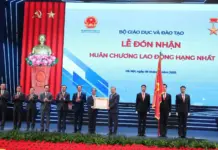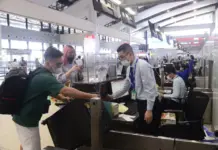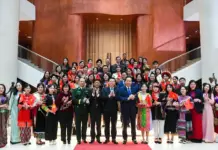Vietnam pledges to further enhance cooperation with international organisations and partners, especially countries within the Mekong River Commission (MRC) and Mekong-Lancang cooperation mechanism, to achieve sustainable cross-border water development goals, VNA citied Deputy Prime Minister Tran Hong Ha.
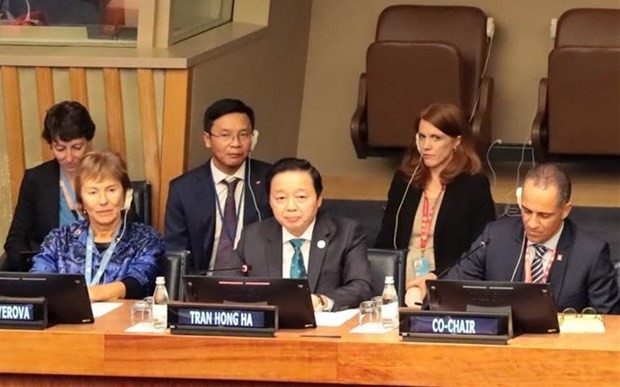 |
| Deputy Prime Minister Tran Hong Ha speaks at the event. Photo: VNA |
Delivering a keynote speech on March 23 at the United Nations conference on mid-term comprehensive review on the Decade for Action “Water for Sustainable Development” for the 2018-2022 period, Ha said 60% of Vietnam’s water resources come from trans-boundary rivers. Vietnam also engages in the MRC’s model of cooperation which has garnered significant attention from many countries. Worldwide, over 40% of the global population are living in trans-boundary river and lake basins.
Sharing comprehensive, inclusive and fair approaches to cooperation in water resource management, Ha suggested strengthening the global and regional legal frameworks for the use and management of trans-boundary water resources; adopting an integrated, nature-based approach to managing transboundary water resources as a unified entity in the building and implementation of planning, programmes and projects; and enhancing transparent and equitable consultation mechanisms among the countries.
He stressed that the use and exploitation of water should take into account local livelihoods, socio-economic activities, and preservation of traditional cultural values and ecosystem associated with trans-boundary water resources.
The official proposed establishing UN agencies and bodies to coordinate and support sci-tech and financial activities, developing a global database on trans-boundary water resources, river basins and monitoring system, and setting ethical standards for behaviours towards trans-boundary water resources.
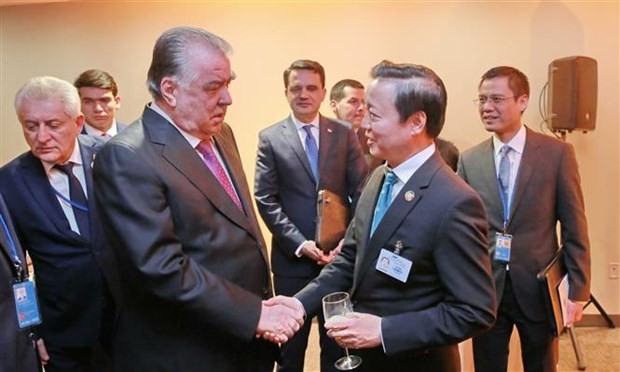 |
| Deputy PM Tran Hong Ha meets President of Tajikistan Emomali Rahmon. Photo: VNA |
Within the framework of the event, Deputy PM Ha met with President of Tajikistan Emomali Rahmon and suggested both nations consider boosting cooperation in climate change adaptation and water resource management in the coming time.
Meeting Director-General of the UN Food and Agriculture Organisation (FAO) Qu Dongyu, Ha sought the FAO’s support to improving Vietnam’s capacity of managing natural resources, especially agricultural land, trans-boundary and inland water resources.
Qu affirmed that FAO will continue providing technical and technological support for Vietnam’s agriculture sector, making it easier for Vietnam to join triangular and South-South cooperation in food and agriculture.
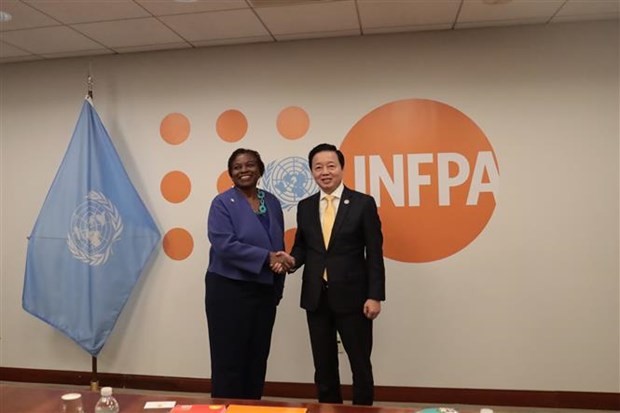 |
| Deputy PM Tran Hong Ha and UNFPA Executive Director Natalia Kanem (Photo: VNA |
In a meeting with Executive Director of the United Nations Population Fund (UNFPA) Natalia Kanem, Ha suggested the fund offer continued support to build and launch social social welfare policies in Vietnam, with a particular focus on vulnerable groups to ensure that no one is left behind.
He also proposed the building of an index to assess population, reproductive health, adolescents and gender equality in line with international practices.
Kanem vowed to help Vietnam effectively carry out the Country Programme for Vietnam for 2022-2026, as well as study and enforce policies related to the Law on Gender Equality, prevention of gender-based violence, and response to population aging issues.
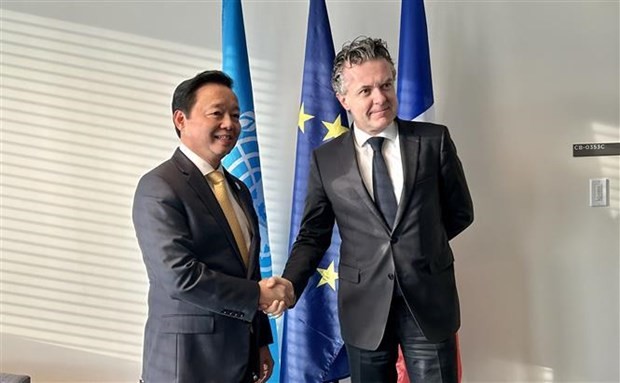 |
| Deputy PM Tran Hong Ha meets French Minister for Ecological Transition and Cohesion of the Territories Christophe Béchu. Photo: VNA |
In a working session with French Minister for Ecological Transition and Cohesion of the Territories Christophe Béchu, the Vietnamese official suggested that both sides reinforce technical and technological cooperation in protecting water resources, reducing greenhouse gas emissions and coping with climate change, especially in fulfilling emission reduction commitments.
Bechu affirmed that France always considers Vietnam one of the priority partners in the region. He highlighted the need for joint work to implement the Joint Declaration on Just Energy Transition Partnership (JETP) that matches Vietnam’s conditions and situation.
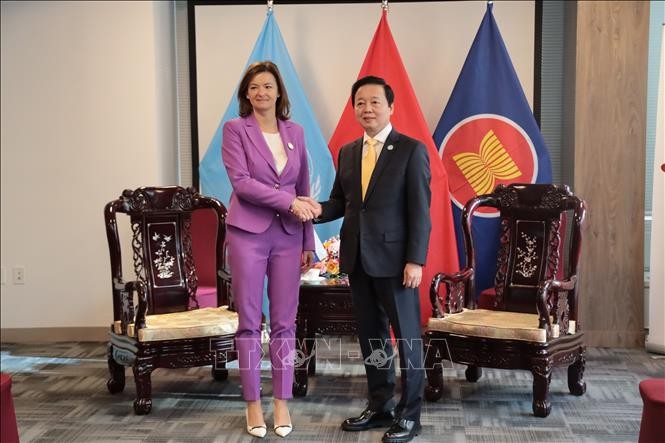 |
| Deputy PM Tran Hong Ha meets Deputy Prime Minister and Foreign Minister of Slovenia Tanja Fajon. Photo: VNA |
In a conversation with Deputy Prime Minister and Foreign Minister of Slovenia Tanja Fajon, the Vietnamese Deputy PM called on both countries to continue working closely together on climate change response and management of water resources.
Fajon, for his part, affirmed that Slovenia advocates promoting multifaceted cooperation with Vietnam, especially in water management and climate change response while offering mutual liaison at multilateral forums, particularly in the UN.
In a dialogue with US Special Presidential Envoy for Climate John Kerry, Ha emphasised that Vietnam considers climate change and energy transition priority cooperation areas between the two nations.
He wished that the US Government will continue assisting Vietnam in delivering commitments announced at the 26th UN Climate Change Conference of Parties (COP 26) and effectively realising the Political Declaration on JETP.
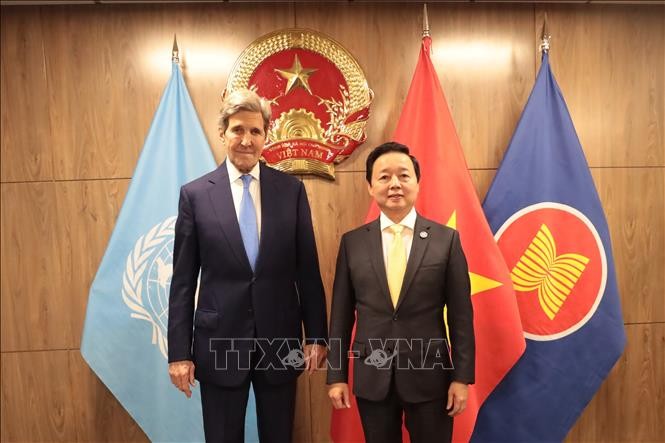 |
| Deputy PM Tran Hong Ha meets US Special Presidential Envoy for Climate John Kerry. Photo: VNA |
Kerry affirmed that the US wishes to step up collaboration with Vietnam in all areas. He also expressed his wish to accelerate the effective delivery of commitments at the COP 26, the energy transition process and building of a low-carbon economy in Vietnam.
Deputy Foreign Minister Do Hung Viet told the VNA that located in the lower Mekong River basin, Vietnam attaches importance to the use and management of water resources which directly impact the lives of tens of millions of people. That’s why Vietnam has actively engaged in both bilateral and multilateral cooperation frameworks, notably the MRC or UN frameworks, he stressed.
Earlier, on March 22, Counsellor Le Thi Minh Thoa, Deputy Permanent Representative of Vietnam to the UN, highlighted the significance of water security as a foundation for stability and development of each country, in the UN Security Council’s Arria-formula meeting on March 22 on achieving a better protection of water-related essential services and infrastructure for the civilian population during armed conflicts.
The meeting was attended by Executive Director of UNICEF Catherine Russell, Director-General of the International Committee of the Red Cross (ICRC) Robert Mardini, UN High Commissioner for Refugees (UNHCR) Filippo Grandi, and representatives from nearly 50 countries.
Many countries and international organisations highly valued the council’s Resolution 2573 (2021) initiated by Vietnam on the protection of essential infrastructure for people’s lives, while calling for the strengthening of the implementation of obligations under international humanitarian law, and emphasising the need for a deeper involvement of the council in this regard.






